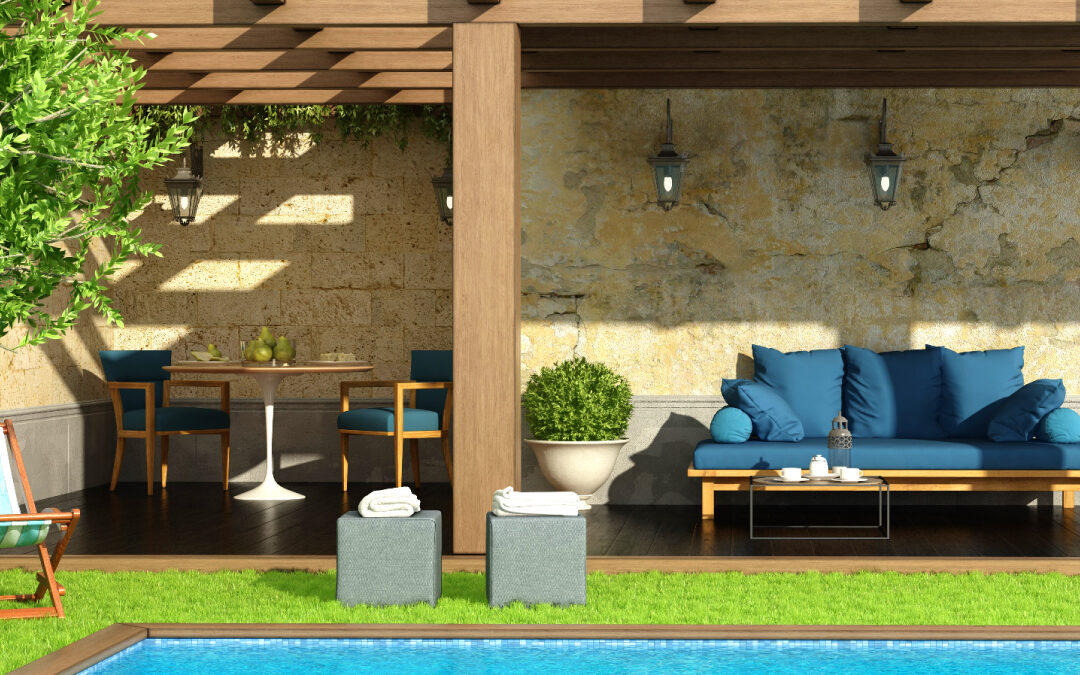Are you thinking about adding a composite pergola outside? WPC stands for wood-plastic composite or WPC pergolas. Pergolas designed to enhance outdoor spaces are increasingly made with WPC material. In this article, we’ll discuss the advantages and disadvantages of WPC pergolas to help you decide if they’re suitable for your project.
Understanding Wood-Plastic Composite (WPC): The Perfect Match For Composite Pergolas
Before delving into the advantages and drawbacks, it’s essential to understand the concept of wood-plastic composite (WPC). Wood-plastic composites, or plastic wood or WPC, are versatile materials widely used in indoor and outdoor settings such as parks, gardens, balconies, and walls.
They offer durability and aesthetic appeal, making them suitable for various outdoor products, including plank floors, railings, fences, and pergolas. Specifically, a WPC pergola is a product constructed from new plastic-wood composite materials primarily used in outdoor decoration to support climbing vines or potted plants. Due to its construction from plastic wood, boasting solid wood’s tactile warmth and excellent waterproof and moisture-resistant properties, it’s a good choice for outdoor areas because it looks nice and is functional.
Benefits of WPC Pergolas
✅ Durability and Longevity: Unlike traditional wood, WPC pergolas stand out for their remarkable durability, offering resistance to rot, decay, and insect damage. They can handle harsh weather, even strong sunlight, heavy rain, and saltwater exposure, making them a reliable long-term investment, perfect for enhancing outdoor spaces. This reliability can provide security, knowing your pergola will stand firm even in the harshest weather.
✅ Low Maintenance: WPC pergolas demand little upkeep thanks to their moisture-proof and anti-corrosion properties. These properties make them resistant to rot, deformation, and cracking often associated with solid wood structures. Unlike natural wood pergolas, they don’t need painting, staining, or sealing. They can be easily maintained with occasional cleaning using soap and water, ensuring they remain attractive and functional for years.
✅ Prevent Insects and Termites: Wood-Plastic Composite Pergolas/WPC pergolas excel in deterring insects and termites thanks to their polymer construction, which boasts a 1.3g/cm³ density, significantly higher than the 0.5g/cm³ found in solid wood. This elevated density contributes to the prolonged durability of WPC pergolas, enhancing their resistance to pests and ensuring a longer lifespan.
Furthermore, compared to traditional solid wood flower racks, WPC grape racks maintain a conventional appearance and offer customizable designs tailored to specific installation requirements and personal preferences. This versatility in design makes WPC pergolas an attractive and practical choice for outdoor spaces seeking aesthetic appeal and functionality.
✅ Versatility in Design: WPC pergolas boast versatility in design, providing an extensive array of customization options to suit diverse preferences. WPC can be effortlessly molded and shaped to accommodate intricate designs and architectural details, whether you prefer a modern, rustic, or traditional style. Moreover, with a wide selection of colors, you can choose the ideal shade that complements and enhances your outdoor space, ensuring a tailored and visually appealing addition to your property.
✅ Eco-Friendly Features: WPC pergolas are an excellent choice for environmentally conscious homeowners due to their use of recycled materials, which reduces waste and minimizes the depletion of natural resources. Additionally, the production process of WPC pergolas typically emits fewer greenhouse gases than traditional wood pergolas, further contributing to environmental sustainability. By opting for a WPC pergola, you actively contribute to sustainable practices, helping to mitigate environmental impact and support a greener future for generations to come.
Drawbacks of WPC Pergolas(Wood-Plastic Composite Pergolas)
Cost: Though initially more expensive than traditional wood options, WPC pergolas last long and need little upkeep, so they’re an excellent money-saving choice. By investing in a WPC pergola, homeowners can enjoy extended use and fewer replacement costs, making it a wise investment for the future.
Limited Color Options: While WPC pergolas may not offer as extensive a range of colors as natural wood, you can still achieve a harmonious outdoor aesthetic by choosing a color that complements your existing decor and surroundings. Additionally, many manufacturers offer customization options, allowing you to tailor the color of your WPC pergola to suit your preferences and style preferences.
Susceptibility to Scratches and Stains: WPC pergolas are generally more resistant than natural wood but can still be susceptible to scratches and stains, primarily if not handled carefully. Avoiding dragging heavy objects across the surface and promptly cleaning any spills can help maintain the appearance of your pergola over time.
Fade: Extended exposure to direct sunlight can cause fading in some WPC materials commonly used in pergolas. However, modern technological advancements, such as UV-resistant coatings, have significantly reduced this issue. When selecting a WPC pergola, opting for high-quality materials from reputable manufacturers can help minimize the risk of fading and ensure the longevity of your outdoor structure.
When it comes to enhancing your outdoor space, WPC pergolas offer unmatched durability, style, and eco-friendliness. To learn more about what makes the best pergolas and how to enhance them to suit your outdoor living needs, feel free to reach out to Ecoworks. Our team is here to provide expert advice and guidance to help you create the perfect outdoor retreat tailored to your preferences.
About the Author

Hans Joakim Cedurland
Co-Owner, EcoWorks Pools & Outdoors Chair & President, Swedish-American Chamber of Commerce – Texas
Hans Joakim Cedurland is the co-owner of EcoWorks Pools & Outdoors, a premier Texas-based company specializing in complete backyard transformations—from custom-designed pools to luxurious outdoor kitchens and living spaces. With over two decades of executive leadership in the real estate and construction sectors, Hans brings a wealth of knowledge, vision, and hands-on expertise to every project.
Hans holds a Bachelor’s Degree in Marketing and Economics from IHM Business School, and is currently serving as the Chair and President of the Swedish-American Chamber of Commerce – Texas, a role he’s held since 2016. His leadership and strategic insight have helped bridge business and cultural connections across continents.
At EcoWorks, Hans champions customer satisfaction and long-term value, ensuring every outdoor space not only meets but exceeds expectations. His blog contributions reflect his commitment to innovation, craftsmanship, and the transformative power of outdoor living.

